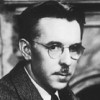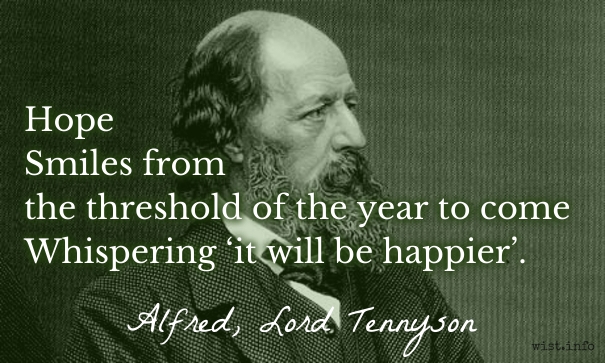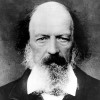What is a Kiss? Alacke! at worst,
A single Dropp to quenche a Thirst,
Tho’ oft it prooves in happie Hour,
The first swete Dropp of one long Showre.Charles Godfrey Leland (1824-1903) American humorist, journalist, folklorist
“In the Old Time,” st. 4, The Music-Lesson of Confucius (1872)
(Source)
Quotations about:
anticipation
Note not all quotations have been tagged, so Search may find additional quotes on this topic.
And to await a pleasure, is itself a pleasure.
[Und ein Vergnügen erwarten, ist auch ein Vergnügen.]Gotthold Lessing (1729-1781) German playwright, philosopher, dramaturg, writer
Minna von Barnhelm, Act 4, sc. 6 [Minna] (1763) [tr. Holroyd/Bell (1888)]
(Source)
Are you happy now? Are you likely to remain so till this evening? or next week? or next month? or next year? Then why destroy present happiness by a distant misery, which may never come at all, or you may never live to see it? for ever substantial grief has twenty shadows, and most of them shadows of your own making.
Sydney Smith (1771-1845) English clergyman, essayist, wit
Memoir of the Reverend Sydney Smith, by His Daughter, Lady Holland, Vol. 1, ch. 11 (1855)
(Source)
Advice for fighting melancholy / depression / anxiety by "taking short views of life" and not borrowing trouble.
Hope is the feeling we have that the feeling we have is not permanent.
Mignon McLaughlin (1913-1983) American journalist and author
The Neurotic’s Notebook, ch. 5 (1963)
(Source)
It is well to give when asked, but it is better to give unasked, through understanding.
Kahlil Gibran (1883-1931) Lebanese-American poet, writer, painter [Gibran Khalil Gibran]
The Prophet, “Giving” (1923)
(Source)
For a long time it seemed to me that real life was about to begin, but there was always some obstacle in the way. Something had to be got through first, some unfinished business; time still to be served, a debt to be paid. Then life would begin. At last it dawned on me that these obstacles were my life.
For whoever reflects on the nature of things, the various turns of life, and the weakness of human nature, grieves, indeed, at that reflection; but while so grieving he is, above all other times, behaving as a wise man: for he gains these two things by it; one, that while he is considering the state of human nature he is performing the especial duties of philosophy, and is provided with a triple medicine against adversity: in the first place, because he has long reflected that such things might befall him, and this reflection by itself contributes much towards lessening and weakening all misfortunes; and, secondly, because he is persuaded that we should bear all the accidents which can happen to a man, with the feelings and spirit of a man; and lastly, because he considers that what is blameable is the only evil; but it is not your fault that something has happened to you which it was impossible for man to avoid.
[Neque enim qui rerum naturam, qui vitae varietatem, qui imbecillitatem generis humani cogitat, maeret, cum haec cogitat, sed tum vel maxime sapientiae fungitur munere. Utrumque enim consequitur, ut et considerandis rebus humanis proprio philosophiae fruatur officio et adversis casibus triplici consolatione sanetur: primum quod posse accidere diu cogitavit, quae cogitatio una maxime molestias omnes extenuat et diluit; deinde quod humana humane ferenda intelligit; postremo quod videt malum nullum esse nisi culpam, culpam autem nullam esse, cum id, quod ab homine non potuerit praestari, evenerit.]
Marcus Tullius Cicero (106-43 BC) Roman orator, statesman, philosopher
Tusculan Disputations [Tusculanae Disputationes], Book 3, ch. 16 (3.16) / sec. 34 (45 BC) [tr. Yonge (1853)]
(Source)
(Source (Latin)). Alternate translations:
For he that considers the order of Nature, and the Vicissitudes of Life, and the Frailty of Mankind is not melancholly when he considers these things, but is then most principally imploy'd in the exercise of Wisdom, for he reaps a double advantage; both that in the consideration of man's circumstances, he enjoyeth the proper Office of Philosophy; and in case of Adversity, he is supported by a threefold Consolation. First, that he hath long consider'd that such accidents might come; which consideration alone doth most weaken and allay all Afflictions. Then he cometh to learn, that all Tryals common to men, should be born, as such, patiently. Lastly, that he perceiveth there is no Evil, but where is blame; but there is no blame, when that falls out, the Prevention of which, was not in man to warrant.
[tr. Wase (1643)]
For whoever reflects on the nature of things, the various turns of life, the weakness of human nature, grieves indeed at that reflection; but that grief becomes him as a wise man, for he gains these two points by it; when he is considering the state of human nature he is enjoying all the advantage of philosophy, and is provided with a triple medicine against adversity. The first is, that he has long reflected that such things might befall him, which reflection alone contributes much towards lessening all misfortunes: the next is, that he is persuaded, that we should submit to the condition of human nature: the last is, that he discovers what is blameable to be the only evil. But it is not your fault that something lights on you, which it was impossible for man to avoid.
[tr. Main (1824)]
For neither does he who contemplates the nature of things, the mutations of life, the fragility of man, grieve when he thinks of these matters, but then most especially exercises the office of wisdom. For, by the study of human affairs, he at once pursues the proper aim of philosophy, and provides himself with a triple consolation for adverse events: -- first, that he has long deemed them possible to arrive; which one consideration has the greatest efficacy for the extenuation and mitigation of all misfortune: and, next, he perceives that human accidents are to be borne like a man: and, finally, because he sees there is no evil but fault, and that there is no fault where that has happened which man could not have prevented.
[tr. Otis (1839)]
Indeed, he who thinks of the nature of things, of the varying fortune of life, of the weakness of the human race, does not sorrow when these things are on his mind, but he then most truly performs the office of wisdom; for from such thought there are two consequences, -- the one, that he discharges the peculiar function of philosophy; the other, that in adversity he has the curative aid of a threefold consolation: first, because, as he has long thought what may happen, this sole thought is of the greatest power in attenuating and diluting every trouble; next, because he understands that human fortunes are to be borne in a way befitting human nature; -- lastly, because he sees that there is no evil but guilt, while there is no guilt in the happening of what man could not have prevented.
[tr. Peabody (1886)]
For the person who reflects on the nature of things, on the variety of life, and the precarity of human existence is not sad in considering these things but is carrying out the duty of wisdom in the fullest way. For they pursue both in enjoying the particular harvest of philosophy by considering what happens in human life and in suffering adverse outcomes by cleansing with a three-part solace. First, by previously accepting the possibility of misfortune—which is the most way of weakening and managing any annoyance and second, by learning that human events must be endured humanely; and third, by recognizing that there is nothing evil except for blame and there is no blame when the event is something against which no human can endure.
[tr. @sentantiq (2021)]
But aren’t we, the living, wretched since we must die? What pleasure can there be in life, when day and night we must reflect that we have to die, and at any moment?
[Qui vivimus, cum moriendum sit, nonne miseri sumus? quae enim potest in vita esse iucunditas, cum dies et noctes cogitandum sit iam iamque esse moriendum?]
Marcus Tullius Cicero (106-43 BC) Roman orator, statesman, philosopher
Tusculan Disputations [Tusculanae Disputationes], Book 1, ch. 7 (1.7) / sec. 14 [Auditor] (45 BC) [tr. Douglas (1985)]
(Source)
(Source (Latin)). Alternate translations:
What say you of us that are alive, can we be other than miserable, since we must die? for what enjoyment can there be in life, when we are to think day and night that die we must of a certain, and it is uncertain whether this or the next Moment?
[tr. Wase (1643)]
What then? we that are alive, are we not wretched, seeing we must die? for what is there agreeable in life, when we must night and day reflect that we may instantly die?
[tr. Main (1824)]
But what? as to us who are alive, are we not miserable? For, what pleasantness can there be in life, when, by night and by day, we have to reflect already, even already, we are to die?
[tr. Otis (1839)]
What then? we that are alive, are we not wretched, seeing we must die? for what is there agreeable in life, when we must night and day reflect that, at some time or other, we must die?
[tr. Yonge (1853)]
Yet are not we who live miserable, seeing that we must die? For what pleasure can there be in life, while by day and by night we cannot but think that we may die at any moment?
[tr. Peabody (1886)]
But how then? Are not we, who live, miserable, seeing that we must die? For what pleasure can there be in life when, night and day, the thought cannot fail to haunt us, that at any moment we must die?
[tr. Black (1889)]
Aren't the living miserable, since we have to die? What joy can there be in life if day and night we are forced to consider the inevitable approach of death?
[tr. Habinek (1996)]
Are we not wretched, we who live though we must die? What joy can there be in life, when we must think day and night that we must at some time die?
[tr. @sententiq (2016)]
We’ll meet again,
Don’t know where,
Don’t know when,
But I know we’ll meet again
Some sunny day.Ross Parker (1914-1974) English pianist, composer, lyricist, actor [Albert Rostron Parker]
“We’ll Meet Again” (1939) [with Hughie Charles]
(Source)
If pleasures are greatest in anticipation, just remember that this is also true of trouble.
Elbert Hubbard (1856-1915) American writer, businessman, philosopher
The Philosophy of Elbert Hubbard (1916)
(Source)
I define anxiety as experiencing failure in advance.
HENRY: I see you stand like greyhounds in the slips,
Straining upon the start. The game’s afoot;
Follow your spirit: and upon this charge,
Cry “God for Harry, England, and Saint George!”William Shakespeare (1564-1616) English dramatist and poet
Henry V, Act 3, sc. 1, l. 34ff (3.1.34-37) (1599)
(Source)
Hope
Smiles from the threshold of the year to come
Whispering “it will be happier.”
Always expecting this and expecting that. May I recommend serenity to you? A life that is burdened with expectations is a heavy life. Its fruit is sorrow and disappointment. Learn to be one with the joy of the moment.
Prospect is often better than possession.
Thomas Fuller (1654-1734) English physician, preacher, aphorist, writer
Gnomologia: Adages and Proverbs, #3958 (1732)
(Source)
HAMLET: If it be now, ’tis not to come; if it be not to come, it will be now; if it be not now, yet it will come. The readiness is all.
William Shakespeare (1564-1616) English dramatist and poet
Hamlet, Act 5, sc. 2, l. 234ff (5.2.234) (c. 1600)
(Source)
To complain of the age we live in, to murmur at the present possessors of power, to lament for the past, to conceive extravagant hopes of the future, are the common dispositions of the greatest part of mankind.
The mind is never satisfied with the objects immediately before it, but is always breaking away from the present moment, and losing itself in schemes of future felicity …. The natural flights of the human mind are not from pleasure to pleasure, but from hope to hope.
Samuel Johnson (1709-1784) English writer, lexicographer, critic
The Rambler, #2 (24 Mar 1750)
(Source)
ARCHBISHOP:O thoughts of men accursed!
Past and to come seems best; things present, worst.William Shakespeare (1564-1616) English dramatist and poet
Henry IV, Part 2, Act 1, sc. 3, l. 112ff (1.3.112-113) (c. 1598)
(Source)
























